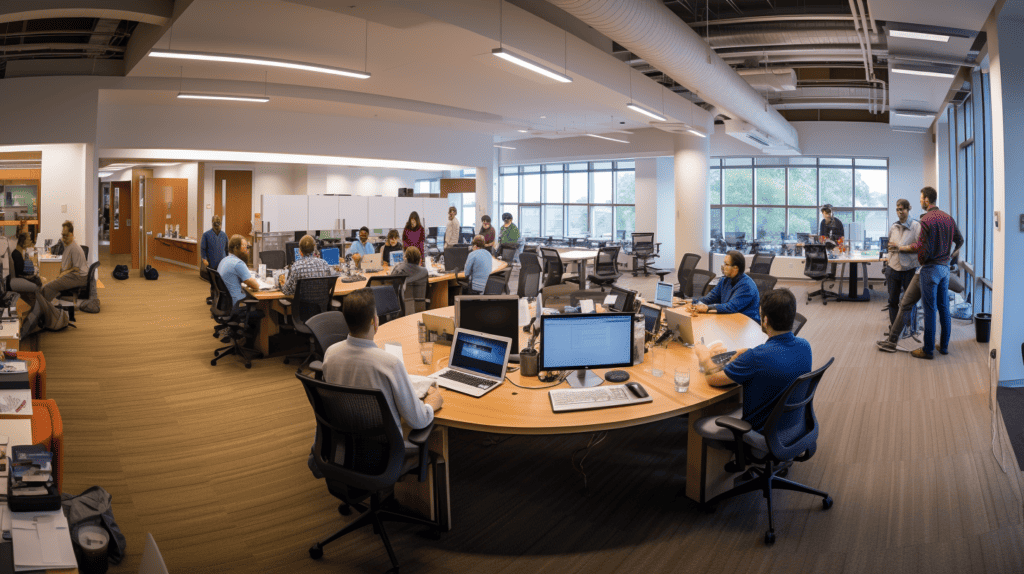As a busy professional, I understand the struggle of trying to juggle countless tasks in a limited time frame. That’s why time-saving strategies and efficient tips are essential for maximizing productivity and achieving a balanced lifestyle. In this article, I will share my insights and experiences on how to get more done with less time.
Key Takeaways
- Efficiency is crucial for busy individuals striving to achieve work-life balance.
- Implementing time-saving strategies and productivity hacks can help maximize productivity.
Streamlining Tasks for Optimal Efficiency
As a busy journalist, I know firsthand the importance of streamlining tasks to improve productivity. Whether it’s managing a deadline or juggling multiple assignments, there are always ways to optimize workflow and save time. Here are some practical tips and time management techniques that I use to identify and eliminate unnecessary steps, enabling me to accomplish more in less time.
Identify Redundant Tasks
The first step in streamlining tasks is identifying redundancies. This involves identifying tasks that can be eliminated, combined, or delegated to others. For example, if I find myself spending too much time formatting articles for different platforms, I might consult with my editor to establish a clear standard for formatting. This way, I won’t have to spend as much time formatting each piece individually, freeing up more time to focus on other tasks.
Set Realistic Goals
To maximize productivity, it’s important to set realistic goals and establish a clear timeline for completing each task. This might involve breaking down larger projects into smaller, more manageable tasks, or setting specific deadlines for each phase of a project.
Minimize Distractions
Distractions can be a major productivity killer, particularly in today’s digital age. To minimize distractions, I try to limit my access to social media and other non-work related sites during work hours. I also make a conscious effort to keep my workspace organized and free of clutter, as this can help reduce distractions and improve focus.
Use Time-Management Tools
There are many time-management tools available that can help streamline tasks and improve efficiency. For example, I often use a task manager app that helps me track my progress on different assignments and deadlines. I also use a calendar program to schedule appointments and set reminders for upcoming deadlines.
By using these tips and techniques, I’ve been able to streamline my work process and accomplish more in less time. Whether you’re a journalist, student, or professional, there are always ways to optimize workflow and improve efficiency. With a little bit of planning and effort, anyone can achieve more in less time.

Prioritizing and Planning: The Key to Effective Time Management
When it comes to managing your time efficiently, prioritization and planning are essential. By setting clear goals, creating schedules, and utilizing planning tools, you can optimize your workflow and increase productivity.
First and foremost, it’s important to identify your priorities. What tasks are the most important to accomplish? What deadlines do you need to meet? By focusing on the most pressing responsibilities first, you can ensure that you’re making the most of your time.
Next, consider creating a schedule or to-do list to help you stay on track. You can use a physical planner or an online tool to map out your day and allocate time for each task. This will help you stay organized and ensure that you’re using your time efficiently.
Additionally, there are a variety of planning tools available to help you streamline your workflow. For example, project management software can help you track progress, delegate tasks, and collaborate with team members. Time-tracking apps can help you monitor how you’re spending your time and identify areas where you can improve efficiency. Experiment with different tools to find what works best for you.
Remember, effective time management isn’t just about getting more done—it’s about achieving a healthy work-life balance. Make sure to set aside time for self-care, hobbies, and spending time with loved ones. By prioritizing both work and personal goals, you can create a fulfilling and productive lifestyle.
Harnessing Technology to Save Time
Technology is a powerful tool that can be harnessed to save time and streamline tasks. With the right tools and applications, individuals can automate processes, eliminate manual data entry, and optimize workflow.
One useful time-saving strategy is to use browser extensions that can reduce the time spent performing repetitive tasks. For example, I use an extension that automatically fills out forms and enters login credentials, which saves me valuable time.
Another useful tool is project management software, which can help teams collaborate and track progress on multiple tasks in real-time. By centralizing data and communication, these tools can increase efficiency and productivity.
Cloud storage is also a valuable resource for accessing documents and files from anywhere, eliminating the need for physical storage devices or email attachments. With cloud storage, I can easily share files and collaborate with colleagues, saving time and increasing productivity.
Finally, automation tools such as Zapier can help integrate various applications, allowing them to communicate and automate tasks. For example, I use Zapier to automatically create new tasks in my to-do list when I receive emails from certain people.
By harnessing technology, individuals can access quick and efficient solutions that can save time and maximize productivity.

Delegating and Outsourcing: Sharing the Load
As much as I’d like to do everything myself, I’ve learned that delegating and outsourcing tasks is a key strategy for maximizing productivity. By identifying tasks that can be assigned to others, I can focus my energy on the most critical aspects of my work and personal life.
When it comes to delegating, it’s important to find reliable resources that can carry out tasks effectively. This could be colleagues or assistants who have the necessary skills and experience to complete the job at hand. I’ve also found that clear communication and setting expectations upfront are critical to ensuring successful delegation.
Outsourcing can be a great option for tasks that may not require a full-time employee. For example, I’ve outsourced tasks such as graphic design and website development to specialized freelancers who are experts in their respective fields. This has not only saved me time but also allowed me to tap into the talent and expertise of professionals across the globe.
Managing delegated responsibilities is also key to efficient time management. By setting clear deadlines and providing regular feedback, I can ensure that tasks are completed on time and to my satisfaction. This allows me to focus on other priorities without worrying about whether tasks are being completed as expected.
By sharing the load through delegation and outsourcing, I’ve been able to maximize my productivity and achieve more with less effort. It’s an important strategy for any busy individual looking to balance their workload and achieve a healthier work-life balance.
Creating an Efficient Workspace
Having an efficient workspace is crucial for maximizing productivity. Here are some tips for organizing your physical and digital environment, minimizing distractions, and implementing productivity-enhancing routines:
Organizing Your Physical Space
- Keep your workspace clean and clutter-free.
- Use organizers, such as trays and bins, to sort and store supplies.
- Arrange your desk ergonomically to reduce strain and discomfort.
Optimizing Your Digital Environment
- Minimize the number of icons and files on your desktop.
- Organize your files into folders and use clear, descriptive names.
- Use productivity apps, such as task managers and timers, to stay focused.
Minimizing Distractions
- Turn off notifications for non-essential apps and emails.
- Use noise-cancelling headphones or play background music to reduce distractions.
- Set boundaries with colleagues or family members to avoid interruptions during work hours.
Implementing Productivity-Enhancing Routines
- Establish a routine for starting and ending your workday.
- Take breaks regularly to avoid burnout and maintain focus.
- Use a planner or calendar to schedule tasks and prioritize your to-do list.

The Power of Effective Communication
As a copywriting journalist, effective communication is key to my job. But it’s not just important for professional success; it’s also crucial for personal productivity. Clear and efficient communication can streamline workflows and minimize misunderstandings.
Emails can easily become overwhelming and time-consuming. To manage them more effectively, I prioritize my inbox by sorting emails by sender, subject, or urgency. I also use templates and canned responses to save time when replying to common inquiries.
Collaborative tools, such as project management software and team messaging apps, can also facilitate efficient communication and task delegation. Setting clear expectations and deadlines is essential when working with others to avoid confusion and delays.
Another important aspect of communication is setting boundaries. It’s easy to get sidetracked by constant notifications and interruptions, but setting aside designated times for checking messages and notifications can help minimize distractions and increase productivity.
In summary, effective communication can significantly impact productivity and success. By streamlining workflows, managing emails, utilizing collaboration tools, and setting boundaries, we can optimize communication processes and accomplish more in less time.
Maximizing Productivity through Self-care and Well-being
As someone who is always on the go, it can be easy to neglect self-care and well-being in the pursuit of productivity. However, taking care of ourselves is crucial for maintaining high levels of productivity. Here are some tips to help you optimize your self-care routine:
- Prioritize rest and relaxation: Make sure to get enough sleep and take time to recharge. Schedule breaks throughout your day to relax and reduce stress.
- Exercise regularly: Physical activity can help boost energy levels and improve mental clarity. Find an exercise routine that works for you and stick to it.
- Eat a balanced diet: Proper nutrition is essential for optimal cognitive function and sustained energy levels. Eat a variety of foods that provide the nutrients your body needs.
- Practice mindfulness: Mindfulness practices such as meditation and deep breathing can help reduce stress and improve focus.
- Set boundaries: It’s important to set clear boundaries between work and personal time. Don’t let work consume your entire life.
By prioritizing self-care and well-being, you’ll be better equipped to handle the demands of a busy schedule and maximize your productivity.

Overcoming Procrastination and Time-wasting Habits
As someone who has struggled with procrastination and time-wasting habits, I understand how challenging it can be to stay focused and productive. However, there are practical strategies and techniques that can help overcome these obstacles and maximize efficiency.
Identify the Root Cause
The first step in overcoming procrastination and time-wasting habits is to identify the underlying reasons for these behaviors. Whether it’s fear of failure, lack of motivation, or feeling overwhelmed, understanding the root cause can help you develop targeted solutions to address the problem.
Break Tasks Into Smaller Steps
Large tasks can feel daunting and overwhelming, leading to procrastination and avoidance. By breaking tasks into smaller, manageable steps, you can reduce the perceived difficulty and increase motivation to get started. Even small progress can provide a sense of accomplishment and momentum to keep moving forward.
Eliminate Distractions
In today’s world, distractions are everywhere, from social media notifications to email alerts. To stay focused and productive, it’s essential to minimize distractions by turning off notifications, closing unnecessary tabs, and finding a quiet, distraction-free workspace.
Set Clear Goals and Deadlines
Clear goals and deadlines provide direction and motivation, keeping you on track and accountable for progress. Use tools like calendars and to-do lists to break down goals into smaller steps and prioritize tasks based on urgency and importance.
Reward Yourself for Progress
Positive reinforcement can be a powerful motivator to overcome procrastination and time-wasting habits. Celebrate progress by rewarding yourself with small treats or breaks, providing a boost of motivation and momentum to keep going.
By implementing these strategies, you can overcome procrastination and time-wasting habits, maximizing efficiency and productivity in all areas of life.

Continuous Learning and Skill Development for Efficiency
As someone who is always looking for ways to optimize my workflow, I believe that continuous learning and skill development are essential for increasing efficiency. By staying informed about industry trends and improving my existing skills, I am able to work smarter and accomplish more with less time.
One useful strategy for continuous learning is to attend workshops or conferences that offer opportunities for growth and development. These events can help you acquire new knowledge and skills, network with like-minded individuals, and gain inspiration for future projects.
Another effective way to improve your skills is to seek feedback and mentorship from experienced professionals in your field. By learning from those who have already achieved success, you can avoid common mistakes and gain valuable insights that can help you work more efficiently.
In addition to these strategies, consider carving out time in your schedule for personal learning and development. This can involve reading industry publications, participating in online courses or webinars, or even pursuing a new hobby that allows you to explore different areas of interest.
Remember, continuous learning and skill development are not just about acquiring new knowledge, but also about improving your existing skills. By identifying areas where you can improve, setting goals, and tracking progress, you can enhance your productivity and achieve even greater success in your personal and professional endeavors.
Setting Realistic Goals and Celebrating Progress
As I’ve discussed throughout this article, efficient time management is crucial for achieving productivity and maintaining a balanced lifestyle. However, it’s also important to set realistic goals and track progress to stay motivated and focused.
When setting goals, I find it helpful to break them down into smaller, more achievable tasks. This not only makes them less overwhelming but also allows me to celebrate progress along the way. It’s important to remember that progress is still progress, no matter how small.
I also make a point to measure success and celebrate achievements. This could be as simple as checking off completed tasks on a to-do list or treating myself to something special after reaching a big milestone.
By setting realistic goals, tracking progress, and celebrating achievements, I’m able to maintain a positive mindset and stay motivated to continue improving my productivity and efficiency.
Conclusion on With Less Time
In today’s fast-paced world, time is a precious commodity, and maximizing productivity is essential for achieving a balanced and fulfilling lifestyle. By implementing the efficient tips, time management techniques, and productivity hacks outlined in this article, busy individuals can accomplish more with less time and reduce stress and burnout.
Remember, streamlining tasks, prioritizing and planning, harnessing technology, delegating and outsourcing, creating an efficient workspace, effective communication, self-care and well-being, overcoming procrastination, continuous learning, and skill development, setting realistic goals, and celebrating progress are all crucial steps toward achieving optimal productivity.
As I wrap up this article, I encourage you to take action and incorporate these strategies into your daily routine. Remember, the key to success is consistency, and by staying committed to these tactics, you’ll soon notice a significant difference in your productivity levels and overall well-being.
So, let’s get started on maximizing our time and accomplishing our goals efficiently!
FAQ on With Less Time
Q: How can I get more done with less time?
A: By implementing time-saving strategies and efficiency tips, you can maximize productivity in your daily life.
Q: What are some tips for streamlining tasks?
A: To improve efficiency, identify and eliminate unnecessary steps, and utilize time management techniques.
Q: How can I prioritize and plan effectively?
A: Prioritization and planning are key to effective time management. Set clear goals, create schedules, and use planning tools.
Q: How can technology help me save time?
A: Technology offers tools, apps, and software that streamline tasks, automate processes, and enhance productivity.
Q: What are the benefits of delegating and outsourcing?
A: Delegating tasks and outsourcing responsibilities can help maximize productivity. Identify tasks to assign, find reliable resources, and effectively manage delegated work.
Q: How can I create an efficient workspace?
A: Organize your physical and digital environment, optimize ergonomics, minimize distractions, and implement productivity-enhancing routines.
Q: How does effective communication impact productivity?
A: Streamline communication processes, manage emails, use collaborative tools, and set boundaries for efficient professional and personal interactions.
Q: How does self-care and well-being affect productivity?
A: Prioritize self-care routines, manage stress, prioritize personal time, and foster a healthy work-life balance to maximize productivity.
Q: How can I overcome procrastination and time-wasting habits?
A: Implement practical strategies and techniques to overcome procrastination and time-wasting habits for efficient task completion.
Q: Why is continuous learning important for efficiency?
A: Constantly acquire new knowledge, improve skills, and stay updated with industry trends to enhance productivity and work smarter.
Q: Why should I set realistic goals and track progress?
A: Setting realistic goals and measuring progress maintains motivation and boosts productivity. Celebrate achievements to foster a positive mindset.





Leave a Reply